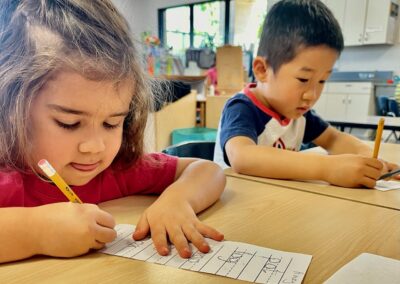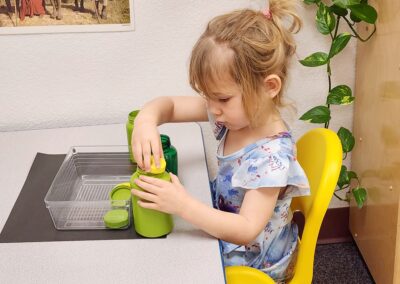THE NORMALIZATION PERIOD
A Beautiful TransformationUnderstanding the Normalization Period in Montessori
When parents first hear the term “normalization” in a Montessori context, it can sound a bit… unusual. But in Montessori education, normalization doesn’t mean making children “normal”—it means helping them return to their natural state of joyful, focused learning.
What Is Normalization?
In Montessori, normalization refers to the process where children adapt to the classroom environment and begin to show the qualities that are naturally within them: concentration, independence, self-discipline, and a love of learning.
This is not immediate—it’s a gradual process that happens as the child becomes comfortable in their environment, builds relationships, and begins to explore the materials with purpose and curiosity.
What It Looks Like:
During normalization, you might notice your child:
- Developing longer periods of concentration
- Gaining confidence in doing things independently
- Showing care for the classroom, materials, and others
- Choosing meaningful work without needing constant direction
- Taking pride in completing tasks on their own
These are all signs that they are becoming normalized—that is, settled, engaged, and thriving in the Montessori environment.
When Does It Happen?
The normalization period varies for each child. Some adjust quickly, while others need more time to feel secure, especially if Montessori is new to them.
In a preschool or kindergarten setting, the first 4–6 weeks of school are especially important. During this time, our teachers focus on:
- Establishing consistent routines
- Building trusting relationships
- Modeling respectful behavior
- Guiding students gently toward purposeful work
This is why we ask parents for patience and partnership during the early weeks—it’s a critical time of growth that sets the tone for the rest of the year.
How Parents Can Support the Process:
- Stick to routines at home — predictability builds security
- Trust the process — normalization takes time, and it’s worth it
- Ask about your child’s work, not just their day — focus on effort and interest
- Be patient with the ups and downs — growth isn’t always linear
Final Thought:
Normalization is one of the most beautiful transformations in Montessori education. It’s the moment when a child begins to truly own their learning, feel at home in the classroom, and find joy in their independence.
It’s the moment when a child begins to truly own their learning, to feel at home in the classroom, and to discover the joy that comes from doing meaningful work. It’s also when they begin to show compassion, self-regulation, and respect for others—hallmarks of both academic and personal growth in Montessori.
As a parent, you may notice your child becoming more independent at home, more thoughtful, or even more excited to come to school. These are all reflections of the inner transformation that’s taking place.
It doesn’t happen overnight, and every child’s path is unique. But when normalization begins to unfold, it’s an incredible thing to observe—and even more rewarding to be part of.




